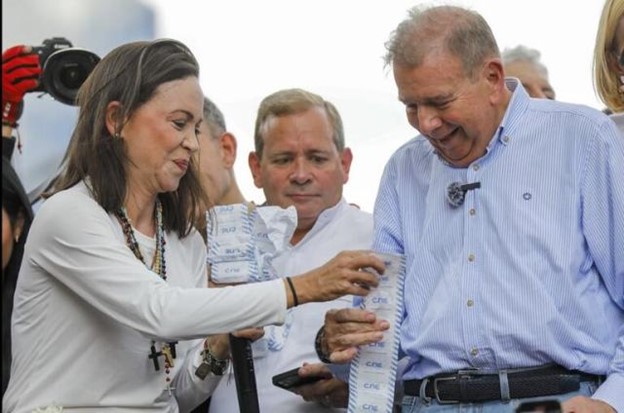
Strategies for hiding the tally sheet print outs until they reached the designated locations, a result of collaboration between witnesses and neighbors.
By Venezuela Vota / La Hora de Venezuela / Efecto Cucuyo
HAVANA TIMES – “I put it in a little book of the Constitution that I had brought and put it between my legs.”
Between the law and her body: this is how an opposition witness safeguarded the voting results from a polling station north of Barquisimeto, in Lara state, on election day on July 28th in Venezuela.
In Caracas, they found another hiding place: “We put it inside our clothes, in our bellies. Then a large group came to accompany us to where the tally sheet copies were being received,” says a witness from a polling station in Candelaria, Caracas.
The strategies used by the witnesses of the opposition candidate Edmundo Gonzalez’s campaign organization to protect the electoral records were varied. However, a common factor was that they had to struggle for several hours with the polling station coordinators from the National Electoral Council (CNE), poll workers, supporters of the ruling United Socialist Party of Venezuela (PSUV), community councils, and even paramilitary to obtain them.
Venezuela Vota, an alliance of independent media outlets, consulted 17 witnesses and polling station members from the Capital District and six states to gather these testimonies.
The “order from above,” according to those who agreed to be interviewed anonymously for this report, was to prevent opposition witnesses from receiving the paper record that the machine prints once the voting at each station is closed. Having the records is the only guarantee of proving how many votes each candidate received. Historically, for the opposition, reaching agreements to cover all the polls with party-accredited witnesses to collect and validate the records had been complex. This time, it seems, they learned from their mistakes.
On July 28th no one was alone:
- “When they handed it to me, I folded it up and put it in my pants pocket, and I left escorted by the neighbors who came to support us,” recounts a witness from Vargas.
- “I safeguarded the record with another person until midnight when I handed it over to the coordinator of the campaign,” says a witness from Barquisimeto.
- “We protected them by moving them from person to person until they reached the hands of the person who had to deliver them to the situation room,” participants explained from Lagunillas, Zulia state.
- “In my ca


